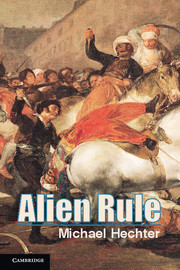Book contents
- Frontmatter
- Book part
- Contents
- List of Figures and Photographs
- Preface
- 1 Introduction
- 2 Alien Rule and Its Discontents
- 3 The Failure of Legitimate Rule in Iraq
- 4 Resistance to Alien Rule in Taiwan and Korea
- 5 Dynamics of Military Occupation
- 6 Academic Receivership as Alien Rule
- 7 Conclusion
- Bibliography
- Index
2 - Alien Rule and Its Discontents
Published online by Cambridge University Press: 05 June 2014
- Frontmatter
- Book part
- Contents
- List of Figures and Photographs
- Preface
- 1 Introduction
- 2 Alien Rule and Its Discontents
- 3 The Failure of Legitimate Rule in Iraq
- 4 Resistance to Alien Rule in Taiwan and Korea
- 5 Dynamics of Military Occupation
- 6 Academic Receivership as Alien Rule
- 7 Conclusion
- Bibliography
- Index
Summary
Actions are held to be good or bad, not on their own merits, but according to who does them, and there is almost no kind of outrage – torture, the use of hostages, forced labour, mass deportations, imprisonment without trial, forgery, assassination, the bombing of civilians – which does not change its moral colour when it is committed by “our” side.
– George OrwellOne of the principal means of coping with cultural conflict in multicultural societies is adopting some form of indirect rule (Hechter 2000). The usual explanation for the ubiquity of this institution is the claim that people prefer to be ruled by members of their own cultural group than by aliens.
At the most basic level, alien rule exists whenever one or more culturally distinct groups are governed by individuals of a different cultural group. This description encompasses the legally distinct situations of colonialism, foreign occupation, and those multinational states whose discontented nations regard their rulers as alien. It also encompasses alien rule in smaller-scale organizations such as corporations, academic departments, and the family. Even so, this definition is even less straightforward than it seems because governance and cultural distinctiveness are contested terms. In this chapter, governance refers to administration – that is, management of the affairs of an organization, institution, or government.
- Type
- Chapter
- Information
- Alien Rule , pp. 27 - 45Publisher: Cambridge University PressPrint publication year: 2013
- 1
- Cited by



